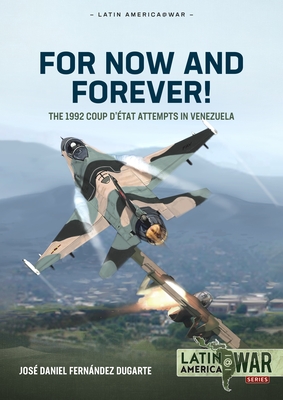For Now and Forever!: The 1992 Coup d'État Attempts in Venezuela

For Now and Forever!: The 1992 Coup d'État Attempts in Venezuela
At the beginning of the 1980s, however, the country was in a situation where it unable to pay its external debt. Economic hardships started and, in consequence, some sectors of Venezuelan society started to question the then-in-force political system; with one such sector being the military.
One group, the Bolivarianos - influenced by the ideas of Simón Bolívar, the man who 150 years before liberated six countries from Spanish rule - and led by Lt. Colonel Hugo Rafael Chávez Frías, considered that it was time for the military to do something. As result, on 4 February 1992, fighting broke out between the Bolivarianos, who aimed to topple President Carlos Andrés Pérez, and troops loyal to the president.
After heavy fighting and a number of casualties that remains disputed, Chávez surrendered in a televised speech that became iconic when he recognized that "(...) for now, the goals (...) could not be achieved (...)".
Later that year, on 27 November, another uprising took place. This time, it was not the Army that was trying to oust President Pérez, but the Air Force. Throughout the day, the skies of Caracas witnessed spectacular dogfights and bombing raids on government buildings. After hours of combat, when it became clear that the rebels would be unable to achieve their goals, they surrendered. This time, however, their leadership decided to escape to Peru, where they were welcomed by then-President Fujimori
Ever since the Spaniards left Latin America, it has been a region where coups and rebellions have followed one after another. However, few are the cases where the impact of such events goes far beyond the borders of the country where they took place, and the two Venezuelan uprisings of 1992 are undoubtedly part of that list.
The events discussed in this book cannot be considered simple military uprisings. The political implications they had make them the effective birth of the Bolivarian Revolution, and therefore, of a new political era in the continent that has been dubbed "Pink Tide".
PRP: 143.64 Lei
Acesta este Prețul Recomandat de Producător. Prețul de vânzare al produsului este afișat mai jos.
114.91Lei
114.91Lei
143.64 LeiLivrare in 2-4 saptamani
Descrierea produsului
At the beginning of the 1980s, however, the country was in a situation where it unable to pay its external debt. Economic hardships started and, in consequence, some sectors of Venezuelan society started to question the then-in-force political system; with one such sector being the military.
One group, the Bolivarianos - influenced by the ideas of Simón Bolívar, the man who 150 years before liberated six countries from Spanish rule - and led by Lt. Colonel Hugo Rafael Chávez Frías, considered that it was time for the military to do something. As result, on 4 February 1992, fighting broke out between the Bolivarianos, who aimed to topple President Carlos Andrés Pérez, and troops loyal to the president.
After heavy fighting and a number of casualties that remains disputed, Chávez surrendered in a televised speech that became iconic when he recognized that "(...) for now, the goals (...) could not be achieved (...)".
Later that year, on 27 November, another uprising took place. This time, it was not the Army that was trying to oust President Pérez, but the Air Force. Throughout the day, the skies of Caracas witnessed spectacular dogfights and bombing raids on government buildings. After hours of combat, when it became clear that the rebels would be unable to achieve their goals, they surrendered. This time, however, their leadership decided to escape to Peru, where they were welcomed by then-President Fujimori
Ever since the Spaniards left Latin America, it has been a region where coups and rebellions have followed one after another. However, few are the cases where the impact of such events goes far beyond the borders of the country where they took place, and the two Venezuelan uprisings of 1992 are undoubtedly part of that list.
The events discussed in this book cannot be considered simple military uprisings. The political implications they had make them the effective birth of the Bolivarian Revolution, and therefore, of a new political era in the continent that has been dubbed "Pink Tide".
Detaliile produsului










